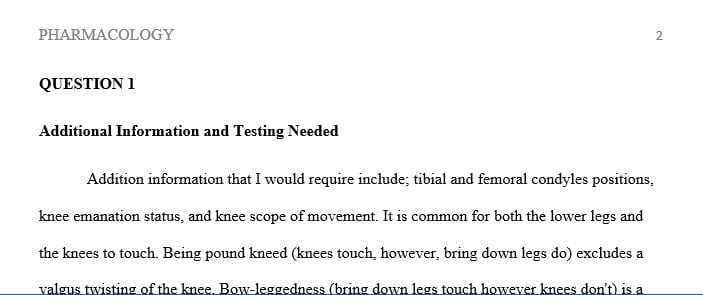MP is a sixty-five-year-old male who has recently retired. He is coming in today for a complaint about pain in his back
Question 1
MP is a sixty-five-year-old male who has recently retired. He is coming in today for a complaint about pain in his back, knees, and hips. He reports that he has been experiencing this pain for the past six months, and he has been able to control the symptoms with OTC Advil. He describes the pain as stiffness and occasional shooting and aching pains radiating all over. He denies any swelling of his joints. However, the OTC medications are not working well, and he is here to see whether there are any other options he might try. On physical exam, he has tenderness on palpation on the right and left hips and both knees are positive for crepitus. All blood work is within normal limits. Answer the following questions:
What additional information would you like to have? Does MP need any additional testing?
What possible issues could contribute to his symptoms?
He asks about injections to both knees to increase his comfort. How would you respond to that?
What would your treatment plan be?
For medications, include dosages and schedules. Include highlights of patient teaching and/or lifestyle alterations. Support your decisions with at least one reference to a published clinical guideline and one peer-reviewed publication.
Question 2
EP is a twenty-five-year-old African American female who has just moved to town and comes to the clinic for her first visit. She has been diagnosed with fibromyalgia. She reports that her previous primary care physician (PCP) was treating her with opiates only. She has been taking hydrocodone/ibuprofen 7.5 mg/200 mg four times daily but notes that this is not helping her. She is asking you for a refill of this medication and any additional treatment you can advise. On physical exam, she is in moderate distress and reports pain when being touched. Answer the following questions:
How would you validate the diagnosis of fibromyalgia?
How would you handle EP’s request for ongoing hydrocodone? Locate any evidence of the efficacy of this treatment for fibromyalgia.
Assuming that the diagnosis is correct, what would your treatment plan be?
Would you recommend any nontraditional therapies?
For medications, include dosages and schedules. Include highlights of patient teaching and/or lifestyle alterations. Support your decisions with at least one reference to a published clinical guideline and one peer-reviewed publication.
Question 3
EP is a fifty-year-old woman who reports experiencing two to three hot flashes per day, occasionally associated with insomnia. She also states she is awakened from sleep about two to three times per week, needing to change her bedclothes and linens due to sweating. Her symptoms began about three months ago, and over that time, her symptoms have worsened to the point where they have become very bothersome. She is concerned about starting any hormonal treatment because she has read news stories that the medication is not safe. She has been successfully treated for depression and is currently doing well on paroxetine. Her current medications include omeprazole 20 mg daily, paroxetine 20 mg, Synthroid 0.075 mg daily, and hydrochlorothiazide 25 mg daily. Her physical exam is normal; her blood pressure is 128/86, her pulse is 78, and her body mass index (BMI) is 30.5. Answer the following questions:
Is there any additional information you would want to collect?
What are the variables you would take into account before deciding how to help her?
What treatment will you recommend?
What non pharmacological treatment would you suggest?
For medications, include dosages and schedules. Include highlights of patient teaching and/or lifestyle alterations. Support your decisions with at least one reference to a published clinical guideline and one peer-reviewed publication.
Question 4
VG is a thirty-one-year-old female who comes in for a routine follow-up. She reports that she has been feeling excessive fatigue over the last month. She also notes that she is having some problems at work, not only because of her fatigue but also because of difficulty concentrating. She also notes that she has gained 10 pounds over the last month, and she is unable to identify the cause of the weight gain. She also notes that her periods are a little heavier and more irregular. She is currently taking daily ferrous sulfate and over-the-counter calcium. According to her medical record, she had a TSH level of 4.2 mIL/L about a year ago. Although this is slightly elevated, no further follow-up was deemed necessary at the time. Repeat blood work today reveals a TSH level of 9.8 mIL/L and a free T4 of 0.72 ng/dL. Answer the following questions:
What additional findings on the physical exam would you look for?
What implication does the previous TSH level have?
What therapy would you institute?
If VG becomes pregnant, what adjustment, if any, would be needed in her thyroid medication?
For medications, include dosages and schedules. Include highlights of patient teaching and/or lifestyle alterations. Support your decisions with at least one reference to a published clinical guideline and one peer-reviewed publication
Solution preview for the order on MP is a sixty-five-year-old male who has recently retired. He is coming in today for a complaint about pain in his back
APA
1836 words
